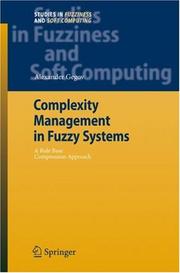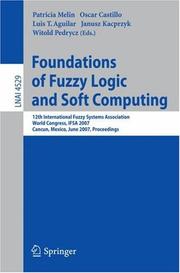| Listing 1 - 6 of 6 |
Sort by
|

ISBN: 9783540495529 3540495525 1280853379 3540495541 Year: 2007 Publisher: Berlin, Germany ; New York, New York : Springer,
Abstract | Keywords | Export | Availability | Bookmark
 Loading...
Loading...Choose an application
- Reference Manager
- EndNote
- RefWorks (Direct export to RefWorks)
SinceinitiatedbyLot?A. Zadehin1965,fuzzysettheoryhastriggeredacons- erably large body of areas to blossom. A fuzzy system is, in a very broad sense, anyfuzzylogic-basedsystemwherefuzzylogiccanbeusedeither asthebasisfor the representation of di?erent forms of system knowledge or the model for the interactions and relationships among the system variables. Fuzzy systems have proven to be an important tool for modeling complex systems for which, due to complexity or imprecision, classical tools are unsuccessful. There have been diverse ?elds of applications of fuzzy technology from medicine to management, from engineering to behavioral science, from vehicle control to computational linguistics, and so on. Fuzzy modeling is a conjunction to understand the s- tem’s behavior and build useful mathematical models. Di?erent types of fuzzy models have been proposed in the literature, among which the Takagi-Sugeno (T-S) fuzzy model is a rule-based one suitable for the accurate approximation and identi?cation of a wide class of nonlinear systems. There has been an - creasing amount of work on analysis and synthesis of fuzzy systems based on T-S fuzzy models. Since 2000, T-S fuzzy model approach has been extended to tackleanalysisandcontrolproblemsofnonlinear systemswith time delay. So far extensive results have been presented for investigating T-S fuzzy systems with time delay, many of which adopt an easy and popular scheme, say, linear matrix inequality (LMI) based method. However, there lacks of a monograph in this direction to provide the state-of-the-art of coverage of this new growing area.
Fuzzy systems. --- Time delay systems. --- Systèmes flous --- Systèmes à retard --- Electronic books. -- local. --- Fuzzy systems --- Time delay systems --- Mechanical Engineering - General --- Operations Research --- Mechanical Engineering --- Civil & Environmental Engineering --- Engineering & Applied Sciences --- Time delay control --- Time delay control systems --- Time delay controllers --- Time-delayed systems --- Systems, Fuzzy --- Engineering. --- Artificial intelligence. --- System theory. --- Control engineering. --- Robotics. --- Mechatronics. --- Control. --- Artificial Intelligence (incl. Robotics). --- Control, Robotics, Mechatronics. --- Systems Theory, Control. --- Feedback control systems --- Process control --- System analysis --- Fuzzy logic --- Systems theory. --- Control and Systems Theory. --- Artificial Intelligence. --- AI (Artificial intelligence) --- Artificial thinking --- Electronic brains --- Intellectronics --- Intelligence, Artificial --- Intelligent machines --- Machine intelligence --- Thinking, Artificial --- Bionics --- Cognitive science --- Digital computer simulation --- Electronic data processing --- Logic machines --- Machine theory --- Self-organizing systems --- Simulation methods --- Fifth generation computers --- Neural computers --- Systems, Theory of --- Systems science --- Science --- Philosophy --- Mechanical engineering --- Microelectronics --- Microelectromechanical systems --- Automation --- Control engineering --- Control equipment --- Control theory --- Engineering instruments --- Programmable controllers

ISBN: 9783540714408 3540714405 9786610951673 1280951672 3540714413 Year: 2007 Publisher: Berlin ; New York : Springer,
Abstract | Keywords | Export | Availability | Bookmark
 Loading...
Loading...Choose an application
- Reference Manager
- EndNote
- RefWorks (Direct export to RefWorks)
The Second International Conference on Fuzzy Information and Engineering (ICFIE2007), built on the success of previous conferences, the ICIKE2002 (Dalian China), is a major symposium for scientists, engineers and practitioners in China as well as the world to present their latest results, ideas, developments and applications in all areas of fuzzy information and knowledge engineering. It aims to strengthen relations between industry research laboratories and universities, and to create a primary symposium for world scientists in fuzzy fields such as Fuzzy Information, Fuzzy Sets and Systems, Soft Computing, Fuzzy Engineering, Fuzzy Operation Research and Management, Artificial Intelligence, Rough Sets and Its Application, Application in Fuzzy Mathematics and Systems, etc.
Information technology --- Fuzzy systems --- Fuzzy mathematics --- Technologie de l'information --- Systèmes flous --- Congresses --- Congrès --- Fuzzy mathematics. --- Fuzzy systems. --- Information technology. --- Engineering & Applied Sciences --- Electrical & Computer Engineering --- Civil & Environmental Engineering --- Information Technology --- Civil Engineering --- Applied Mathematics --- Computer science. --- Artificial intelligence. --- Computer-aided engineering. --- Applied mathematics. --- Engineering mathematics. --- Computer Science. --- Computer-Aided Engineering (CAD, CAE) and Design. --- Appl.Mathematics/Computational Methods of Engineering. --- Artificial Intelligence (incl. Robotics). --- Engineering --- Engineering analysis --- Mathematical analysis --- CAE --- AI (Artificial intelligence) --- Artificial thinking --- Electronic brains --- Intellectronics --- Intelligence, Artificial --- Intelligent machines --- Machine intelligence --- Thinking, Artificial --- Bionics --- Cognitive science --- Digital computer simulation --- Electronic data processing --- Logic machines --- Machine theory --- Self-organizing systems --- Simulation methods --- Fifth generation computers --- Neural computers --- Informatics --- Science --- Mathematics --- Data processing --- Computer aided design. --- Mathematical and Computational Engineering. --- Artificial Intelligence. --- CAD (Computer-aided design) --- Computer-assisted design --- Computer-aided engineering --- Design

ISBN: 9783540388838 3540388834 9786610940660 1280940662 3540388850 Year: 2007 Volume: v. 211 Publisher: Berlin, Heidelberg : Springer Berlin Heidelberg : Imprint: Springer,
Abstract | Keywords | Export | Availability | Bookmark
 Loading...
Loading...Choose an application
- Reference Manager
- EndNote
- RefWorks (Direct export to RefWorks)
This book presents a systematic study on the inherent complexity in fuzzy systems, resulting from the large number and the poor transparency of the fuzzy rules. The study uses a novel approach for complexity management, aimed at compressing the fuzzy rule base by removing the redundancy while preserving the solution. The compression is based on formal methods for presentation, manipulation, transformation and simplification of fuzzy rule bases, which are illustrated by algorithms as well as results from numerous examples and two case studies. The results are directly applicable or easily extendable to a wide class of fuzzy systems and detailed benchmarks for expanding these systems to new areas such as fuzzy networks and fuzzy multi-agent systems are introduced. The intended readers are people from both academia and industry, who would be interested in building and implementing advanced fuzzy systems.
Fuzzy systems. --- Systèmes flous --- Electronic books. -- local. --- System analysis. --- Engineering & Applied Sciences --- Civil & Environmental Engineering --- Applied Mathematics --- Operations Research --- Civil Engineering --- Computer Science --- Network theory --- Systems analysis --- Systems, Fuzzy --- Mathematics. --- Artificial intelligence. --- System theory. --- Applied mathematics. --- Engineering mathematics. --- Systems Theory, Control. --- Appl.Mathematics/Computational Methods of Engineering. --- Artificial Intelligence (incl. Robotics). --- Network analysis --- Network science --- System theory --- Mathematical optimization --- System analysis --- Fuzzy logic --- Mathematical and Computational Engineering. --- Artificial Intelligence. --- AI (Artificial intelligence) --- Artificial thinking --- Electronic brains --- Intellectronics --- Intelligence, Artificial --- Intelligent machines --- Machine intelligence --- Thinking, Artificial --- Bionics --- Cognitive science --- Digital computer simulation --- Electronic data processing --- Logic machines --- Machine theory --- Self-organizing systems --- Simulation methods --- Fifth generation computers --- Neural computers --- Engineering --- Engineering analysis --- Mathematical analysis --- Systems, Theory of --- Systems science --- Science --- Mathematics --- Philosophy --- Systems theory.

ISBN: 9783540474630 3540474633 9786610853311 128085331X 3540483969 Year: 2007 Publisher: Berlin ; New York : Springer,
Abstract | Keywords | Export | Availability | Bookmark
 Loading...
Loading...Choose an application
- Reference Manager
- EndNote
- RefWorks (Direct export to RefWorks)
Neuro–Fuzzy Associative Machinery for Comprehensive Brain and Cognition Modelling" is a graduate–level monographic textbook. It represents a comprehensive introduction into both conceptual and rigorous brain and cognition modelling. It is devoted to understanding, prediction and control of the fundamental mechanisms of brain functioning. The reader will be provided with a scientific tool enabling him to perform a competitive research in brain and cognition modelling.
Neural Networks (Computer) --- Brain. --- Cognition --- Fuzzy Logic. --- Models, Neurological. --- Neural networks (Neurobiology) --- Neural networks (Computer science) --- Fuzzy systems. --- Brain --- Réseaux neuronaux (Neurobiologie) --- Réseaux neuronaux (Informatique) --- Systèmes flous --- Cerveau --- physiology. --- Mathematical models. --- Modèles mathématiques --- Brain -- Mathematical models. --- Neural networks (Computer science). --- Neural networks (Neurobiology). --- Fuzzy systems --- Fuzzy Logic --- Models, Neurological --- Physiology --- Models, Biological --- Models, Theoretical --- Pattern Recognition, Automated --- Biological Science Disciplines --- Artificial Intelligence --- Logic --- Mathematical Concepts --- Central Nervous System --- Mental Processes --- Philosophy --- Natural Science Disciplines --- Investigative Techniques --- Psychological Phenomena and Processes --- Information Science --- Phenomena and Processes --- Computing Methodologies --- Nervous System --- Disciplines and Occupations --- Anatomy --- Humanities --- Psychiatry and Psychology --- Analytical, Diagnostic and Therapeutic Techniques and Equipment --- Civil Engineering --- Computer Science --- Applied Mathematics --- Neuroscience --- Engineering & Applied Sciences --- Civil & Environmental Engineering --- Human Anatomy & Physiology --- Health & Biological Sciences --- Mathematical models --- Systems, Fuzzy --- Artificial neural networks --- Nets, Neural (Computer science) --- Networks, Neural (Computer science) --- Neural nets (Computer science) --- Biological neural networks --- Nets, Neural (Neurobiology) --- Networks, Neural (Neurobiology) --- Neural nets (Neurobiology) --- Computer science. --- Artificial intelligence. --- Applied mathematics. --- Engineering mathematics. --- Computer Science. --- Artificial Intelligence (incl. Robotics). --- Appl.Mathematics/Computational Methods of Engineering. --- Engineering --- Engineering analysis --- Mathematical analysis --- AI (Artificial intelligence) --- Artificial thinking --- Electronic brains --- Intellectronics --- Intelligence, Artificial --- Intelligent machines --- Machine intelligence --- Thinking, Artificial --- Bionics --- Cognitive science --- Digital computer simulation --- Electronic data processing --- Logic machines --- Machine theory --- Self-organizing systems --- Simulation methods --- Fifth generation computers --- Neural computers --- Informatics --- Science --- Mathematics --- System analysis --- Fuzzy logic --- Artificial intelligence --- Natural computation --- Soft computing --- Cognitive neuroscience --- Neurobiology --- Neural circuitry --- Models --- Artificial Intelligence. --- Mathematical and Computational Engineering.

ISBN: 9783540729174 3540729178 9786610951505 1280951508 354072950X Year: 2007 Publisher: Berlin ; Heidelberg : Springer,
Abstract | Keywords | Export | Availability | Bookmark
 Loading...
Loading...Choose an application
- Reference Manager
- EndNote
- RefWorks (Direct export to RefWorks)
This book comprises a selection of papers from IFSA 2007 on new methods and theories that contribute to the foundations of fuzzy logic and soft computing. These papers were selected from over 400 submissions and constitute an imp- tant contribution to the theory and applications of fuzzy logic and soft c- puting methodologies. Soft computing consists of several computing paradigms, including fuzzy logic, neural networks, genetic algorithms, and other techniques, which can be used to produce powerful intelligent systems for solving real-world problems. The papers of IFSA 2007 also make a contribution to this goal. This book is intended to be a major reference for scientists and engineers interested in applying new computational and mathematical tools to achieve intelligent solutions to complex problems. We consider that this book can also be used to get novel ideas for new lines of research, or to continue the lines of research proposed by the authors of the papers contained in the book. The book is divided into 14 main parts.Eachpart contains a set of papers on a common subject, so that the reader can ?nd similar papers grouped together. Some of these parts comprise the papers of organized sessions of IFSA 2007 and we thank the session organizers for their incredible job in forming these sessions with invited and regular paper submissions.
Fuzzy sets --- Fuzzy logic --- Fuzzy systems --- Soft computing --- Ensembles flous --- Logique floue --- Systèmes flous --- Informatique douce --- Congresses. --- Congrès --- Electronic books. -- local. --- Fuzzy logic -- Congresses. --- Fuzzy sets -- Congresses. --- Fuzzy systems -- Congresses. --- Soft computing -- Congresses. --- Mechanical Engineering --- Mathematics --- Engineering & Applied Sciences --- Physical Sciences & Mathematics --- Algebra --- Computer Science --- Mechanical Engineering - General --- Information Technology --- Artificial Intelligence --- Computer science. --- Information technology. --- Business --- Mathematical logic. --- Database management. --- Artificial intelligence. --- Application software. --- Computer Science. --- Artificial Intelligence (incl. Robotics). --- Mathematical Logic and Formal Languages. --- Database Management. --- Computer Appl. in Administrative Data Processing. --- IT in Business. --- Data processing. --- Application computer programs --- Application computer software --- Applications software --- Apps (Computer software) --- Computer software --- AI (Artificial intelligence) --- Artificial thinking --- Electronic brains --- Intellectronics --- Intelligence, Artificial --- Intelligent machines --- Machine intelligence --- Thinking, Artificial --- Bionics --- Cognitive science --- Digital computer simulation --- Electronic data processing --- Logic machines --- Machine theory --- Self-organizing systems --- Simulation methods --- Fifth generation computers --- Neural computers --- Data base management --- Data services (Database management) --- Database management services --- DBMS (Computer science) --- Generalized data management systems --- Services, Database management --- Systems, Database management --- Systems, Generalized database management --- Algebra of logic --- Logic, Universal --- Mathematical logic --- Symbolic and mathematical logic --- Symbolic logic --- Algebra, Abstract --- Metamathematics --- Set theory --- Syllogism --- IT (Information technology) --- Technology --- Telematics --- Information superhighway --- Knowledge management --- Informatics --- Science --- Information systems. --- Artificial Intelligence. --- Business—Data processing.

ISBN: 9783540733997 354073399X 3540734007 Year: 2007 Publisher: Berlin, Heidelberg : Springer Berlin Heidelberg : Imprint: Springer,
Abstract | Keywords | Export | Availability | Bookmark
 Loading...
Loading...Choose an application
- Reference Manager
- EndNote
- RefWorks (Direct export to RefWorks)
Fuzzy logic --- Fuzzy sets --- Fuzzy systems --- Soft computing --- Logique floue --- Ensembles flous --- Systèmes flous --- Informatique douce --- Congresses. --- Congrès --- Mathematical Theory --- Computer Science --- Mechanical Engineering - General --- Engineering & Applied Sciences --- Mathematics --- Mechanical Engineering --- Physical Sciences & Mathematics --- Information Technology --- Artificial Intelligence --- Computer science. --- Computers. --- Mathematical logic. --- Database management. --- Information storage and retrieval. --- Artificial intelligence. --- Image processing. --- Computer Science. --- Artificial Intelligence (incl. Robotics). --- Mathematical Logic and Formal Languages. --- Computation by Abstract Devices. --- Information Storage and Retrieval. --- Database Management. --- Image Processing and Computer Vision. --- Pictorial data processing --- Picture processing --- Processing, Image --- Imaging systems --- Optical data processing --- AI (Artificial intelligence) --- Artificial thinking --- Electronic brains --- Intellectronics --- Intelligence, Artificial --- Intelligent machines --- Machine intelligence --- Thinking, Artificial --- Bionics --- Cognitive science --- Digital computer simulation --- Electronic data processing --- Logic machines --- Machine theory --- Self-organizing systems --- Simulation methods --- Fifth generation computers --- Neural computers --- Data base management --- Data services (Database management) --- Database management services --- DBMS (Computer science) --- Generalized data management systems --- Services, Database management --- Systems, Database management --- Systems, Generalized database management --- Algebra of logic --- Logic, Universal --- Mathematical logic --- Symbolic and mathematical logic --- Symbolic logic --- Algebra, Abstract --- Metamathematics --- Set theory --- Syllogism --- Automatic computers --- Automatic data processors --- Computer hardware --- Computing machines (Computers) --- Electronic calculating-machines --- Electronic computers --- Hardware, Computer --- Computer systems --- Cybernetics --- Calculators --- Cyberspace --- Informatics --- Science --- Information storage and retrieva. --- Computer vision. --- Artificial Intelligence. --- Machine vision --- Vision, Computer --- Artificial intelligence --- Image processing --- Pattern recognition systems --- Information storage and retrieval systems. --- Automatic data storage --- Automatic information retrieval --- Automation in documentation --- Computer-based information systems --- Data processing systems --- Data storage and retrieval systems --- Discovery systems, Information --- Information discovery systems --- Information processing systems --- Information retrieval systems --- Machine data storage and retrieval --- Mechanized information storage and retrieval systems --- Electronic information resources --- Data libraries --- Digital libraries --- Information organization --- Information retrieval --- Optical data processing. --- Optical computing --- Visual data processing --- Integrated optics --- Photonics --- Computers --- Optical equipment
| Listing 1 - 6 of 6 |
Sort by
|

 Search
Search Feedback
Feedback About UniCat
About UniCat  Help
Help News
News